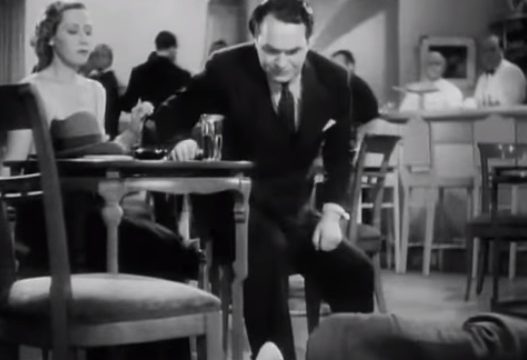“What time does the crime picture start?” a gangster asks at the beginning of Bullets or Ballots. He and his top goon are at the movies, ready to watch the latest film about the exploits of racketeers and killers — actually, a newsreel about their own latest misadventures. But it’s an ironic line too. Bullets or Ballots is technically, per its preview’s pulpy language, about a “detective who SMASHED a Billion Dollar CRIME Syndicate” (not to be confused with The KID who ended the MAFIA!) but who also spends much of his time undercover engaging in mob behavior. Muddying the waters further, the man playing that cop is Edward G. Robinson, the guy who helped invent the kind of cinematic gangster he ultimately goes up against. The crime picture starts now.
Boss Al Kruger (a dapper but tough Barton MacLane) and head lieutenant Bugs Fenner (a wired, homicidal Humphrey Bogart) are living the high life running New York, although the newsreel they’re watching portrays them in a less flattering light — robbing taxpayers! Stopping vegetable shipments! Installing nickel slots in soda shops and corrupting the children! Kruger has just slipped his latest set of charges and one newspaper publisher has had enough, decrying those who “rule by the fear of their bullets — they must be smashed by the power of ballots!” This would seem to set up political machinations, or at least scheming, to justify the title, but the only reason this guy exists is to make enough noise forFenner to gun him down, despite Kruger’s orders to not bother with him. Luckily, the news business overall is unfazed and produces several zooming if not spinning editions later in the movie.
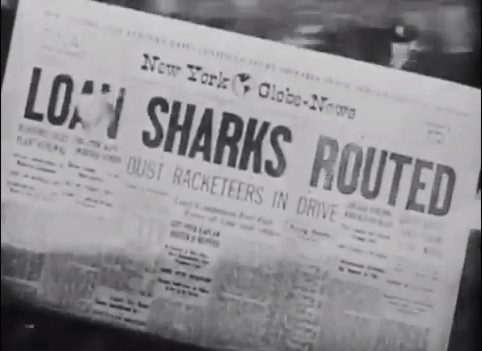
Because while Bogie’s Fenner is a stone killer, Kruger maintains the right facade to be a boss, even serving on the city’s Municipal Improvement Commission — a waft of corruption that foreshadows a stench later on. And he’s pals with Detective Johnny Blake, Robinson’s old-school cop. In Blake’s first scene, he gets pissed when a crook disrespects him and doesn’t tip his hat, telling the bar owner “I thought you don’t let mugs come into this place,” before kicking the crook’s ass without even getting up in a display of ownage not equaled til Spencer Tracy in Bad Day At Black Rock. As a capper, he punches the mug through a window, telling the beat cops to “put him under arrest for destroying property.” Robinson sells this with the rectitude he’d later bring to Double Indemnity. He comes off as a guy who lives by a code instead of one who gets enjoyment from abuse. Play by the code even if you can’t be forced to play by the rules, and he’ll play fair too. As Blake says, “I never double cross anyone, not even a crook.”
Kruger tries to persuade the weary Blake to retire and work for him, saying he could use a good man in his ranks. And he really could! Fenner killing the newspaper publisher has the public in an uproar and a new commissioner comes in, vested with more authority than ever and secret plans to take down the racketeers. This does not sit well with Kruger’s bosses, who turn out to be high-society bankers. They are hidden from the public eye, of course, but the movie wastes very little time in showing they’re the power behind the goons — at what point did movies start revealing this, generally after scenes of the rich folks acting ominously but functioning in society, instead of just baldly stating it? The bankers here are never shown outside of their dealings with the racketeers. Anyway, it’s refreshing to see plutocrats openly depicted upholding the criminal status quo: a quo whose status is now shaky, they tell Kruger — fix your shit or someone else will be in charge.
Fortunately, Blake is now willing to take up his old buddy’s offer since the new commish fired him, and Blake throwing a punch at the new top cop didn’t help matters. And Kruger knows Blake is a stand-up guy — “If you ever made a deal, you’d see yourself dead before you’d go back on it.” So Blake becomes an auditor for the racketeers, learning their business (like how a local garage is their bank for illicit funds) and suggesting improvements. And now that he’s in the mob, Blake — and very clearly Robinson as well — is having a grand old time being a badass, painfully breaking up Fenner’s attempt to bug his apartment and coming back twice as hard on the many gangsters who doubt his loyalty:
Blake: What are you afraid of?
Goon: I don’t like the way your face is fastened on.
Blake: I’ll be down tomorrow and give you a chance to change it.
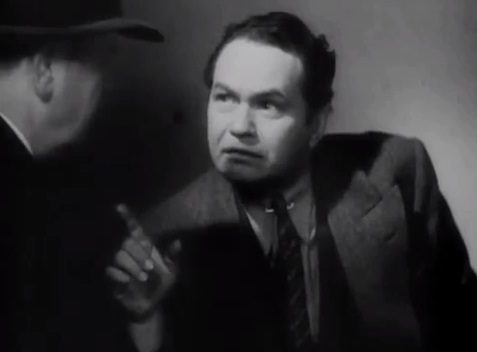
Robinson made his name as the boss in Little Caesar, one of the pre-Code gangster movies that allegedly glorified crime and bad boys and were subsequently phased out after a brief period of intense popularity. As some astute critics noted, this was a clever way of putting him back in the rackets, because of course Blake is working undercover — a fight with a cop gives him an excuse to go into solitary, where he meets the commissioner and updates him on his progress. He gets all the fun of being a bad guy, even dropping a trademark NYEAH! at one point, while technically being on the side of the angels. But working undercover has its price — to distract the gang from their suspicions, he proposes taking over the numbers racket overseen by his quasi-girlfriend Lee (Joan Blondell, fine if not given a lot to do). Lee actually just turned the numbers over to her former hairdresser Nellie, a black woman who came up with the idea, and as Lee puts it “You thought of this game, you deserve to get rich from it!” Which seems surprisingly progressive for 1936! Good thing a white guy comes in to get all the credit while doing none of the work.
And the numbers are so profitable that Kruger takes Blake to meet the bankers, finally giving him a view of the real menace to society. Unfortunately, it also means Kruger is willing to let the commissioner keep raiding less profitable enterprises, like those youth-corrupting nickel slots, since enough money is coming in from the numbers (the commish executes these raids with some gangsterish logic of his own, telling the dismayed crooks “From now on, we act first, and you get an injunction to stop us!”) This capitulation is too much for Fenner, who kills Kruger and tells Lee that Blake is the one who stole her business. Bogie plays Fenner as a hothead at a simmer the whole movie, constantly exuding menace. He’s smarter than his boss but still second in command; he has no chill but he is also generally right. I realized almost immediately where I’d seen him before: he’s Eddie Dane in Miller’s Crossing, cold and suspicious and vicious but without even the hint of love the Dane has. They both have their own warped code, though — don’t let anyone give your work shit — and the undermining of their work not through open opposition but fraud is intolerable. Not to mention foretold by the underminer’s time with the opposition in the first place. Why does nobody listen? Time to take care of things.
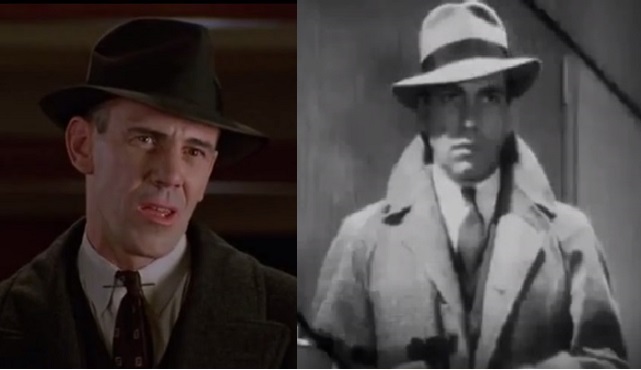
Blake does not wait around to get got. He bluffs his way into control of Kruger’s gang himself and gives the cops the high sign to raid the gang’s garage while he takes the cash to the bankers. The raid goes off without a hitch, but Fenner slips the net and follows Blake back to his place, where they shoot it out in a staircase showdown that convinced me even more that the Coens were mining this for Miller’s Crossing. Fenner is killed and Blake mortally wounded, which he conceals from the police so he can make one final trip to the bankers’ fancy-pants back room. They take his dirty money and get arrested, and Blake collapses, but not without some final detecting: “Check the bullets in me with compared to those in Kruger and the publisher,” he tells the commissioner, wanting to nail Fenner and all those other yeggs trying to get away with crime. “I’d like to think when those mugs pass a policeman, they’ll keep tipping their hats,” Blake says as he dies. A cop — definitely not a gangster! — to the end.
An end that is a mere 82 minutes from the beginning, by the way. William Keighley directs Seton I. Miller and Martin Mooney’s screenplay with little flair but zero fat; it’s depressingly easy to imagine this as a two-and-a-half hour movie with just as much plot but padded out with empty transitions and montages and maybe some kind of lengthy tracking shot of people talking in a car as they go from one neighborhood to another. Keighley trusts his actors, and he trusts the story and makes a highly enjoyable movie that rarely slows down as it moves through a turning if not twisting plot. It’s unassuming, and maybe that’s how it slips some interesting ideas in under the censor’s nose.
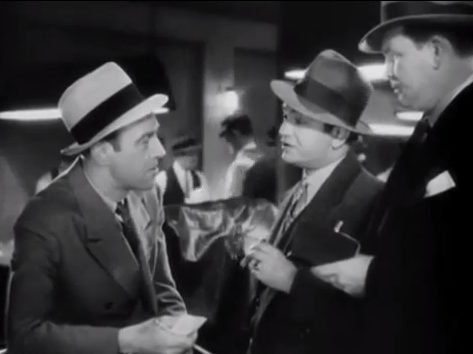
It’s not enough for Bullets or Ballots to end with the gangsters dead, as even pre-Code films might conclude (after several reels of those gangsters wreaking havoc). It has to close with a “support your local law enforcement” PSA. And Robinson delivers it with zero irony; he’s back in the upright mode he was at the beginning. But the movie is too sly to fully align itself with pro-law/anti-gangster pieties. It’s hard to tell across the decades but a tongue appears to be in cheek* during that early newsreel showing kids debauched by pinball and slots. The violence is often hilariously anodyne — it’s one thing for a guy shot from across the street to merely clutch his chest and bloodlessly fall over (especially if he’s falling off a saloon roof in a Western) but quite another when a dude is plugged from a few feet away and appears to be expiring of indigestion — but the people behind the violence, fat and rich off the money of regular joes and none the worse the wear for the Depression, are shown without gloss or sympathy. They’re vultures in tuxedos, and if Blake’s work has any real nobility, it’s in his willingness to take them down just as hard as that mug who he shoves through a window at the start of the film.
And what of Blake? We’re told he’s an honest guy who would rather die than betray anyone, cop or crook. Well, he betrays some crooks, for a greater good of course. And he dies. It’s common for naïve stories about cops and crooks to hold the cops to a higher morality. If we break the law, we’re just as bad as they are! And the counter to that is something like The Untouchables, about how it is right and good that law enforcement breaks one set of laws to stop criminals from breaking another set of laws, and how meaningless all this crossing of lines is when they’ll just be erased anyway. Bullets and Ballots is trickier than either, saying that the ends may justify the means but they must be paid for in full, no matter how worthy the cause or dastardly the opponent. Good people can’t be bad without cost, and the man who betrays a mug is due for a reckoning just like anyone else, no matter who gives who the high hat.
*My DVD of this contained a few extras, chief among them the fantastic Breakdowns of 1936, a blooper reel made from Warner productions of that year. I have no idea where this screened at the time, certainly not in theaters because of the blue language involved; but watched today, it’s a great poke in the nose to the always-insidious concept that irony is new and funny is discovered instead of uncovered. There are plenty of outtakes that are funny as such, like Robinson cracking up Bogart on the set of this film, but there are also more “GOD DAMMITS” than any random dozen episodes of It’s Always Sunny In Philadelphia. And this is all held together by a pompous, piss-taking narrator periodically announcing “Time … marches on,” to the trumpeting of raspberries. It’s one thing to hear Humphrey Bogart sound like Rob McElhenney, quite another to hear the 1936 version of Tom Servo:

